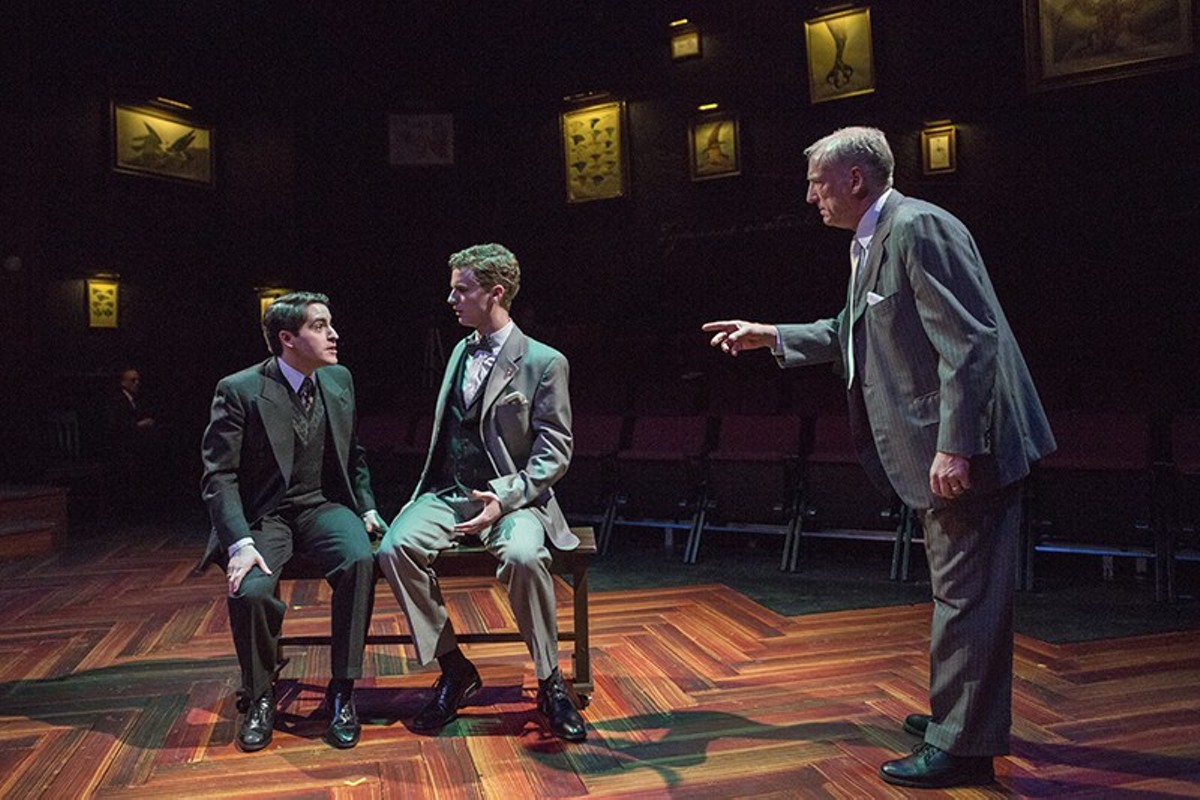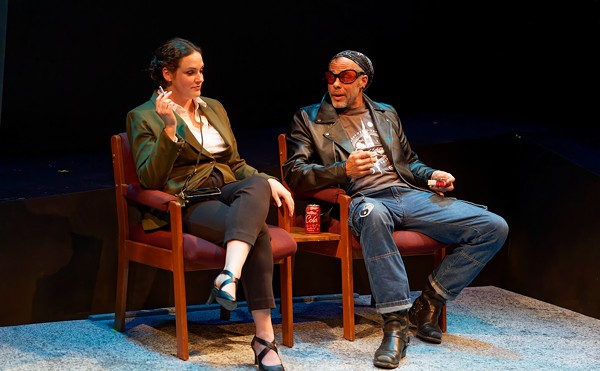John Logan's drama Never the Sinner is inspired by the true story of young and handsome thrill-killers Leopold and Loeb, but it is not a blow-by-blow factual account. Instead, Logan goes looking for an artistic truth — what occurred between the two youths that drove them to kill? — which he frames as a love story.
Under Rick Dildine's direction at New Jewish Theatre, Never the Sinner becomes something more than a meditation on the peculiar alchemy that takes place when two people merge into a single entity. Contained within its flashbacks and courtroom scenes is a debate about whether justice is better served by mercy or vengeance, as well as a subtly told chase story that is as engrossing as the love story is salacious.
We first encounter our murderous millionaires as Leopold (Jack Zanger) delivers a lecture on the hunting technique of the falcon, which contrasts with its shy nature when threatened. Behind him in the darkness sits Loeb (Pete Winfrey), chuckling at the merciless nature of the falcon's practice of stunning its prey with a powerful blow to the head. Leopold breaks into an oleaginous smile at the thought of it, his saturnine features becoming ghoulish.
Loeb appears to be the main force in their relationship. Garrulous, classically handsome and prone to flights of fantasy that bring him to a near-ecstatic state, Loeb's passions seem to be the only thing that matter to him, other than being recognized as a paragon of Nietzsche's theory of the übermensch. His money, his many girlfriends and Leopold's love for him all pale beside his dream of wowing the world with his brilliance, something he planned to demonstrate by getting away with a series of increasingly elaborate crimes, with Leopold's help. (Leopold gets sexual favors out of the bargain.)
It is in this excitable state that they hatch their scheme to commit the "perfect crime," which will prove to all of Chicago that they cannot be restrained by the law or mundane morality; they are the supermen. And so they decide to kill a younger boy and convince the police their victim is being held hostage somewhere in the city.
Despite their "supermen" status, they muck it up and are caught.
The men who will later serve as their prosecutor and defense attorney watch the pair fumble their way through the planning, capture and actual killing from chairs set just outside the performance area (a benefit of the theater's in-the-round staging). Scenic designers Peter and Margery Spack frame the black box theater as a well-appointed study, with wood paneling and anatomical drawings of birds on the walls, to sumptuous effect. They also make good use of "red crime-solving yarn" (you see it in every police procedural, connecting clues on a wall), which spans the walls and brings us all into the connective tissue of the story.
Prosecuting attorney Robert Crowe (Eric Dean White) is determined to see Leopold and Loeb hang, and not just because he's up for reelection next year and all Chicago is baying for blood (John Reidy, Maggie Conroy and Will Bonfiglio serve as the city's chorus, reading outraged news reports and filling in as hostile witnesses when needed). Crowe must face off against the renowned Clarence Darrow (John Flack), who is morally opposed to the death penalty but enters a guilty plea nonetheless; he hopes to persuade the court that more murders won't solve anything and win life sentences for his clients.
Both White and Flack are excellent, bringing a palpable heat to their arguments about the nature of justice and the sanctity of life. Winfrey, too, does great work as a laughing, almost emotionless killer. He rejects Leopold's early suggestion that they kill Loeb's brother with "no, it might upset mom," which Winfrey delivers with detached hesitancy. That hesitancy returns when Loeb finally realizes that the court most likely doesn't care about his superman fantasies, and that his death is imminent. Winfrey suddenly goes to pieces, and then just as quickly becomes still when Leopold agrees with his assessment of their chances.
Zanger delivers the outstanding performance of the show, however. Still a junior in college, his portrayal of Leopold is one of mature nuance and subtle power. Rational and calculating at all times, he is the falcon of the opening scene. For him the killing is as justifiable "as an entomologist killing a beetle on a pin."
While imprisoned, Leopold composes aloud a letter to his father to thank him for mailing ornithological books to the prison. In it he expresses his surprise to read that the falcon has a smaller brain than the common crow. Zanger's voice slows as he says this aloud, realizing with reserved horror the implication: As smart as he believes himself to be, Robert Crowe has him dead to rights. (Bird imagery is woven throughout: If you take a closer look above Crowe's chair during the intermission, you'll see a print of crows and blackbirds hanging above it. A massive depiction of a raptor's talon is paired with Zanger's opening remarks.)
These twinned stories of pursuit, bloodlust and plain old lust all come together in the final scene, which is chronologically the first. Leopold and Loeb meet at a party, and a dark flame of attraction flickers between them. That flame ultimately consumes them, but not before the falcon takes his prey.






